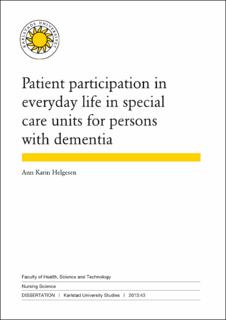| dc.description.abstract | Sammendrag fra DIVA portal:
The aim of this thesis was to acquire knowledge about patient participation in everyday life of persons with dementia living in SCUs in nursing homes.
Data collection and analysis in studies I-III was carried out according to Grounded Theory. Data was collected by open non- participant observations during 51 hours, and conversations with 8 residents and 17 health care personnel (I), interviews carried out twice with 12 relatives (II) and 11 nursing personnel (III), and by a study specific questionnaire based on the findings from study I-II to 233 relatives (IV). Descriptive and non-parametric statistics were used (IV).
Presence of nursing personnel in body, mind and morality was found to be the prerequisite for patient participation (I). This required personnel with high competence in dementia care, commitment to and interest in the resident, and continuity in their work (I, III). Wellbeing and dignity in the resident’s everyday life was found to be the most important goal, not necessarily a high level of patient participation (II-III). The level of participation had to be adjusted to the resident’s ability and wish to take part in decisions in the very moment. However, the level was often primarily adjusted to suit the personnel’s ideas about how to carry out daily care (I, III). Relatives had an important role in the participation process by interacting, and exchanging information, with the personnel. By forming a basis for individualised care in this way, relatives made a difference to the resident’s everyday life and contributed to their wellbeing and dignity (II-IV). The SCU’s context also affected patient participation (I-IV).
Patient participation must be given attention by leaders and be prioritised in dementia care. Nursing personnel can enhance patient participation by promoting relatives’ partaking in the participation process, as this has potential for further contributing to quality of care. | nb_NO |
